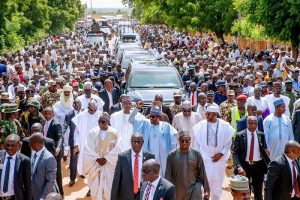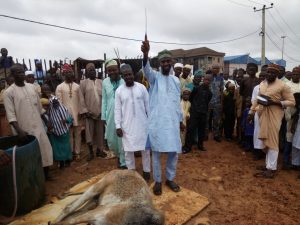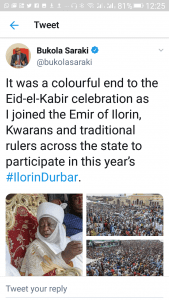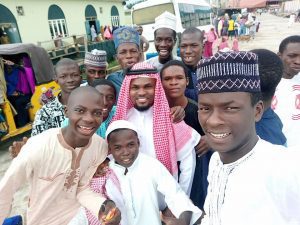The glitz and glamour of the 1439 AH Eid-ul-Adha may have come and gone, but for Nigerian Muslim faithful home and abroad, it was a memorable experience that will linger on.
The Federal Government declared Tuesday and Wednesday (August 21-22) as public holidays to mark one of the most peaceful festivals in recent times in Nigeria. However, the celebration continues till Friday, August 24 (after the Maghrib prayer), in accordance with the Shari’iah.
In Islam, the day of Eid, which fell on Tuesday, August 21 this year, is called Yaum-un-Nahar, also known as the third day of Hajj. It is followed by the days of Tashreeq – the 11th, 12th and 13th of Dhul-Hijjah – which fall on Wednesday, Thursday and today, Friday, respectively.

According to authentic narrations, the Prophet (SAW) was reported to have said that the days of Tashreeq are days of eating, drinking and remembering Allah immediately after the prescribed prayers by reciting:
“Allahu Akbar, Allahu Akbar, Allahu Akbar, La Ilaha Ilallahu Wallahu Akbar, Allahu Akbar, Wa Lillahil Hamd” (Allah is great, Allah is great, Allah is great, there is no god but Allah, Allah is great, Allah is great, All praise is for Allah).
Checks by Muslim News revealed that many civil servants and students of higher institutions have since resumed work and school respectively after the two-day holiday. In Abuja, Lagos and other States, almost all offices were open as at the time of filing this report yesterday. Some of the Muslim workers and students related their Eid experiences.
“It’s my first Eid with my wife and new job”
Adeoye AbdulHakeem, an indigene of Lagos based in the Federal Capital Territory (FCT), Abuja described the Eid-ul-Adha as a festival of sacrifice.
Mr Adeoye celebrated the Eid in Abuja with his newly wedded wife. “I didn’t travel home because it’s my first Eid with my wife and new job, and we decided to spend it together. It was indeed very special”.
Narrating how it went down, the broadcaster said: “We started our Eid celebration on the Eid eve. I invited my wife to my office and that was her first time there. After close of work, we visited some Islamic stores to pick few materials we could afford for the Eid, and we observed our first Solat as a couple at the National Mosque.
“D-Day: Eid Prayer was brief, and from there we took ice cream like we were on a date. We got back home and prepared a delicious Sallah meal together. I took some of our Sallah meal to a bachelor friend, after which we also visited a family friend”, he stated.
“It’s an opportunity to…share meat, cook, crack jokes, catch up on old gists”
Ismail-Badmus Nusaybah, a Lagos-based physiotherapist from Ibadan, Oyo State saw Eid-ul-Adha as an avenue to meet with her favourite cousins again, while obeying the injunctions of Allah.
“It is an opportunity to celebrate with my huge family, share meat, cook, crack jokes, catch up on old gists and of course, take a lot of pictures. Looking forward to the next one, Insha Allah,” she concluded.

“It’s an opportunity for me to worship in a special way”
Babatunde Sheriff Balogun, famously known as “Learners”, said Eid-ul-Adha is an opportunity for him to worship in a special, merry, grateful, graceful and congregational manner.
The Kwara-born educationist observed his Eid prayers in Lagos with his family.
According to him, “I celebrate Eid-ul-Adha in Lagos because all of my family are in Lagos. My family is a large one. I will need my personal car if ever I am to take them anywhere. Boarding commercial buses/cars could be very stressful, and I hate inconvenience, especially for children.”
Mr Balogun described his experience at this year’s Eid as spectacular.
“This is the first Eid I made a serious effort to slaughter a ram, but as Allah would have it, I paid but have not gotten the ram till now. However, the incident and some other ones were not strong enough to affect my festive mood. This is one of my happiest times in life. AlhamduliLlah.”
“Family reunion, most important reason I travel for Eid”
For Mr Umar AbdurRazaq, who works as a Medical Sales Representative, family reunion is the most important reason he travelled home for Eid.
Every year, Umar, together with his parents and siblings, join the rest of the Awayewaserere Family of Ilota Compound, Aran-Orin, Kwara State for the Eid-ul-Adha, which they celebrate in grand style.
“It is the most interesting part of coming for Eid in the village”, he said.
According to him, “In my village, we have lined up programs for both the adults and the youths throughout the days of Eid, including the day of Arafah. One of such is Baba Ewe. That is basically what I enjoy, apart from the reunion.
Baba Ewe, just like the Ilorin Durbar and Ojude-Oba in Ijebu-Ode, was held at the village open field on Wednesday, August 22, the second day of Eid-ul-Adha, Muslim News findings revealed.
At the annual event, the elders relate important historical milestones of the town and share jovial moments with the young ones.
Umar said; “There was a modification to the celebration of Baba Ewe this year. Unlike in the past, it was more like a competition with active participation from the youth. We hope it gets better next year.”
“It’s a show of love, gratitude to Allah”
Hajia Bushrah Olagunju said Eid-ul-Adha is a celebration in obedience to the commandment of Allah as exhibited by Prophet Ismail and Prophet Ibrahim.
According to her, it is a show of love, gratitude and submission to the will of Allah.
Hajia Olagunju, who had for years celebrated with her family in Ede, Osun State, said she decided to stay back in order to feel what it is like to celebrate Eid in Lagos.
“My experience was memorable. I visited places like the Lekki Conservation Centre, the National Theatre and Shoprite, spending time with my friends and thanking Allah all the way”, she recounted.

“We miss Sallah at home” – Nigerians in diaspora lament
Nigerian Muslims in diaspora were filled with excitement as they celebrated the Eid-ul-Adha 2018 in their respective countries of residence. They however did not hide their feelings of missing home.
INDIA
Samiat Owo-Alade, an Ikorodu-born Nigerian based in Bangalore, India described the Eid as a time to come together with family.
Miss Owo-Alade however said despite not being the only Nigerian in India, Eid in a foreign land can never be like Eid at home.
“AlhamduliLlah for witnessing this year’s Eid. It was fun to celebrate with few friends but to be frank, it can never be like Eid in Lagos. Honestly, I miss home. Nowhere like home”, she stated.
MALAYSIA
Sukaynah Shuaib is an indigene of Edo State, but she was based in Lagos until early 2018 when she relocated to Selangor, Malaysia for higher education.
According to her, Eid-ul-Adha is a celebration of slaughtering and a reflection of the sacrifice and obedience of Prophet Ibrahim (may Allah be pleased with him).
The student of International Islamic University, Malaysia (IIUM) shared the joyous moment of the Eid with her new found friends, whom she described as “friends that are like family”. She however admitted there is no place like home.
“The experience here is totally different. It is entirely a new experience. The people here don’t celebrate like we do at home, where you would have to visit your families and friends. In some instances, people staged carnival-like events but here, I was at home all day. Alhamdulillah, it was fun,” she concluded.

QATAR
In a chat with Muslim News from her abode in Doha, Qatar, Hajia Nusaybah DhikruLlah admitted that Eid without one’s extended family is boring.
“I miss a lot the merrymaking, the gists, the excitement, the slaughtering of the cow and my family, especially my siblings”, she said.
While her siblings in Nigeria were preparing Sallah cow to be divided into three parts according to the Sunnah, the daughter of the erudite Nigerian Muslim scholar, Sheikh DhikruLlah Shafi’i related how she and her immediate family observed the Eid in Doha.
“Although we are not the only Nigerians in this environment, we decided to observe the Eid indoors. We went to pray Eid and returned home. We had some food to eat and drink, and we went back to sleep. However, some celebrated together in their neighborhoods”, she added.
The Sallah meat, according to the Shari’iah, should be divided into three parts, one each for one’s family, friends and relatives (who were not financially buoyant enough to buy the sacrificial animal), and the poor and needy.
JORDAN
To Ustadh Ibn Taofeeq Abdul Azeez, an Ogun State-born Nigerian who lives in Amman, Jordan, Eid-ul-Adha is an Islamic festival to commemorate the willingness and obedience of the Father of Faith (Ibrahim) to follow Allah’s command to sacrifice his son.
The respected scholar with many followers on social media (Facebook) said: “These are days Muslims of the world make special efforts to remember their Lord, pray to Him and unite themselves on goodness.
“That is why you see Muslims who don’t even observe Solah before, join the Solah of this great Eid. These days are days of celebration, days of showing love to one another, days of exchanging gifts and prayers, and days which call to unity, no matter the rancour between us.
“The days of Eid are the 10th, 11th, 12th, and 13th of Dhul-Hijjah. These days are the days of eating and drinking. That is why we must not ignore the poor, needy and less privileged. We must help them celebrate and enjoy the best of these days”, he stated.
Like other Muslims in diaspora, Ustadh Ibn Taofeeq said it was not a good feeling to miss Eid celebrations in one’s home town, stressing that: “It has been part of me to celebrate Eid away from home. I consider here and Nigeria as my homes. My Arabian friends were here to celebrate with me.
“I however missed my mum, teachers, students, childhood friends and families. Most especially, I missed that lively and lovely culture”, he concluded.
BAHRAIN
For the first time in 6 years, Mr Nurudeen Yusuf, who resides in Manama, Bahrain with his family, returned home for the Eid-ul-Adha celebration. He was one of the hundreds of Muslims living in diaspora who reunited with their extended families in Nigeria, years after living and working in foreign lands.




This is a beautiful one and I pray this initiative lives beyond those behind it. It’s high we celebrated our own in a grand style. Ilal amaam in sha Allah
Eid is a wonderful period to break away from work and enjoy with family and friends.
But more importantly is the historical background of Eid. We pray to Allah to count this year’s Eid as an act of worship and spare us till the next Eid while worshipping Him.